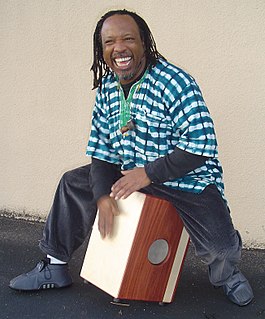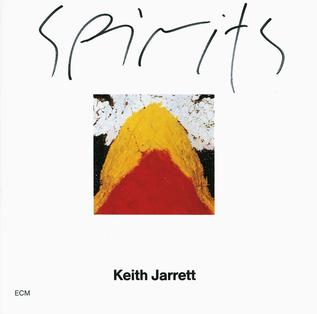A membranophone is any musical instrument which produces sound primarily by way of a vibrating stretched membrane. It is one of the four main divisions of instruments in the original Hornbostel-Sachs scheme of musical instrument classification.
The music of Trinidad and Tobago is best known for its calypso music, soca music, chutney music, and steelpan. Calypso's internationally noted performances in the 1950s from native artists such as Lord Melody, Lord Kitchener and Mighty Sparrow. The art form was most popularised at that time by Harry Belafonte. Along with folk songs and African- and Indian-based classical forms, cross-cultural interactions have produced other indigenous forms of music including soca, rapso, parang, chutney, and other derivative and fusion styles. There are also local communities which practice and experiment with international classical and pop music, often fusing them with local steelpan instruments.

Ustad Zakir Hussain is an Indian tabla virtuoso, composer, percussionist, music producer, film actor and eldest son of tabla player Ustad Allah Rakha.

Timbales or pailas are shallow single-headed drums with metal casing. They are shallower than single-headed tom-toms, and usually tuned much higher, especially for their size. The player uses a variety of stick strokes, rim shots, and rolls to produce a wide range of percussive expression during solos and at transitional sections of music, and usually plays the shells of the drum or auxiliary percussion such as a cowbell or cymbal to keep time in other parts of the song.
A hand drum is any type of drum that is typically played with the bare hand rather than a stick, mallet, hammer, or other type of beater.

The goblet drum (also chalice drum, tarabuka, tarabaki, darbuka, derbake, debuka, doumbek, dumbec, dumbeg, dumbelek, tabla, tablah, tableh, toumperleki, tumbak, or zerbaghali, is a single head membranophone with a goblet shaped body used mostly in Egypt and is considered the National symbol of Egyptian Shaabi Music, also in parts of the West Asia, North Africa, South Asia, and Eastern Europe. The African djembe-wassolou is also a goblet membranophone. This article focuses on the Eastern and North-African goblet drum.

Trilok Gurtu is an Indian percussionist and composer whose work has blended the music of India with jazz fusion and world music.

A cajón is a box-shaped percussion instrument originally from Peru, played by slapping the front or rear faces with the hands, fingers, or sometimes implements such as brushes, mallets, or sticks. Cajones are primarily played in Afro-Peruvian music, but has made its way into flamenco as well. The term cajón is also applied to other box drums used in Latin American music, such as the Cuban cajón de rumba and the Mexican cajón de tapeo.
The music of Suriname is known for kaseko music, and for having an Indo-Caribbean tradition.

Ojos de Brujo was a nine-piece band from Barcelona who describe their style as "jipjop flamenkillo". The band sold over 100,000 copies of their self-produced Barí album, and has received several awards, among these the BBC Radio 3 World Music Award for Europe in 2004.
Ulrich Schröder, known under the pseudonym Praful, is an acid jazz artist who performs on several instruments including tenor and soprano saxophones, Indian bamboo flutes, pandeiros, Fender Rhodes and many electronic effects. Two of his CDs One Day Deep and Pyramid in Your Backyard have won many awards and worldwide recognition. "Sigh", included in the One Day Deep CD and as a single, had stayed in the Billboards for over 70 weeks.

Pete Lockett is an English percussionist and recording artist. Lockett is known as a versatile and prolific percussionist, collaborating with many artists. He is well-versed in percussion traditions from music cultures around the world, from traditional Carnatic and Hindustani music of North and South India to traditional Japanese taiko drumming, with a style ranging from blues, funk and rock to classical, folk and ethnic and from Arabic to Electronic. His instruments include tabla, mridangam, kanjira, ghatam, vocal percussion, dholak, naal, bhangra dhol from north and south India; darabuka, req, bendir, frame-drums from the Middle East; congas, bongos, timbales and berimbau from Latin American; as well as the Irish bodhran, Nigerian udu, West African djembe, Japanese taiko, Western drum set, and many custom percussion effects and self-built instruments. He also works extensively with electronics and samplers, both live and in the studio, to create densely alternative percussion fabrics.

Ivan Tucakov is a world music composer, guitarist, producer and promoter currently living in Vancouver, British Columbia, Canada.
Trichy Sankaran is an Indian percussionist, composer, scholar, and educator. He was awarded the Madras Music Academy's Sangeetha Kalanidhi in 2011. As a mridangam vidwan, he has been called a "doyen among the percussionists of India" in Sruti magazine. Since the early 1970s, he has performed and recorded in a number of cross-cultural projects. In 2017, he was awarded the "Tiruchirapalli Carnatic Musicians Lifetime Achievement Award".
Lenny Seidman is a tabla player, a composer, a co-director of the Spoken Hand Percussion Orchestra, and a World Music/Jazz curator at the Painted Bride Art Center in Philadelphia.
Milton "Milt" Holland was an American drummer, percussionist, ethnomusicologist, and writer in the Los Angeles music scene. He pioneered the use of African, South American, and Indian percussion styles in jazz, pop and film music, traveling extensively in those regions to collect instruments and learn styles of playing them.

A tabla is a pair of twin hand drums from the Indian subcontinent. Since the 18th century, tabla has been the principal percussion instrument in Hindustani classical music, where it may be played solo, as accompaniment with other instrument and vocals, and as a part of larger ensembles. Tabla is also frequently played in popular and folk music performances in India, Bangladesh, Pakistan, Nepal, Afghanistan and Sri Lanka. The tabla is also an important instrument in the bhakti devotional traditions of Hinduism and Sikhism, such as during bhajan and kirtan singing. It is one of the main qawali instrument used by Sufi musicians. Tabla also features in dance performances such as Kathak.

Beats Antique is a U.S.-based experimental world fusion and electronic music group. Formed in 2007 in conjunction with producer Miles Copeland, the group has become noted for their mix of different genres as well as their live shows, which mix samples and heavy percussives with Tribal Fusion dance and performance art.
" If the male synonym for the tabla is Zakir Hussain, then the female equivalent has to be Anuradha Pal. " - Hindustan Times, 2011.

Spirits is a double album by Keith Jarrett on which he does not perform solo piano, jazz standards or the kind of music he is usually known for. Instead he performs vocals, guitar, glockenspiel, soprano saxophone, recorder, piano, tabla, flutes and percussion on multiple tracks that were recorded at his home studio in New Jersey. It was released by ECM Records in 1986 and Jarrett dedicated it to his wife Rose Ann Colavito.










